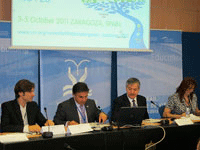- ON THE DECADE
- THE DECADE'S CAMPAIGN
- REPORTING ON PROGRESS
- THE DECADE'S PROGRAMMES
- FOCUS AREAS
-
- Access to sanitation
- Financing water
- Gender and water
- Human right to water
- Integrated Water Resources Management
- Transboundary waters
- Water and cities
- Water and energy
- Water and food security
- Water and sustainable development
- Water and the green economy
- Water cooperation
- Water quality
- Water scarcity
- FOCUS REGIONS
- RESOURCES FOR
- UN e-RESOURCES
International UN-Water Conference. Water in the Green Economy in Practice: Towards Rio+20. 3-5 October 2011
Water is the engine for the green economy, UN Water chair says

13 October 2011 - "Change happens through people getting together like they have at this conference. Rio+20 is about practice, it's not about theory", stated Kenza Robinson (Sustainable Development Officer at UNDESA) at the end of the three-day UN-Water conference 'Water in the Green Economy in Practice: Towards Rio+20' in Zaragoza, Spain, last week.
The conference provided a valuable and unusual opportunity for interaction and sharing of practical implementation experiences between case study presenters from diverse countries around the world. It contributed to the preparation process for next year's UN Conference on Sustainable Development, known as Rio+20. The documents, papers and comments provided by the conference participants form the basis of the 'water toolbox', that will be submitted as input for Rio+20.
UN-Water Chair Zafar Adeel closed the conference by stressing that "water is the engine for the green economy" and that "we need to make sure that it gets plugged in". Water is closely linked to the green economy because it is interwoven with sustainable development issues such as health, food security, energy and poverty.
The event showcased successful water projects from all continents that illustrated how specific tools can contribute to developing a green economy. "We have seen real opportunities for instruments such as Payment for Ecosystem Services having great success throughout Latin America, but also in Africa and Asia", said Josefina Maestu, Director of the UN-Water Programme on Advocacy and Communication.
Water technology, innovation and economic instruments were identified as key tools for the transition to a green economy, but also the importance political commitment and enabling policies was stressed. "We would like to see the leaders at Rio putting forward some concrete ideas for change".
The urgency to shift from current practices is clear. Experts predict that by 2030 the amount of water needed by humans exceeds the amount available by 40 per cent. This conference formed one step on the long and winding road to Rio+20 and as Josefina Maestu concluded, "we all have a joint responsibility to progress to a different economic model. We must not miss this opportunity".
>> Conference Home
>> Statements from UN Agencies
>> Video recording of sessions

>> Ch1 Water on the Road to Rio+20
>> Ch2 Challenges and opportunities for water in the transition to a GE
>> Ch3 Thematic conference papers
>> Ch4 Conference summary: Water in the GE in practice
>> Ch5 The way forward
>> A1 Water toolbox: A contribution to Rio+20
>> A2 Feedback report
>> A3 Communications report
>> Case papers by tool
>> By region 
>> Developing countries 
>> Developed countries 
>> Agenda 
>> Economic instruments
>> Green jobs
>> Sustainable financing
>> Investments for biodiversity protection
>> Water technology
>> Water planning
>> ESCWA region
>> LAC region
>> Conference daily
>> Interviews with case presenters 
>> Presentations
>> Communications articles
>> Conference media brief 
>> Daily press notes
>> Interviews with session conveners
>> Issues information briefs
>> Tools information briefs
>> Banners
>> Reader on water and the Green Economy 
>> Conference poster 
 >> Discussion forum
>> Discussion forum
 >> Twitter
>> Twitter
>> Water, energy and food security
>> Spanish Business Dialogue
>> Stakeholder dialogue on the Green Economy in Spain
>> Technical visit
>> Organizers
>> Participants
>> Conference committee
>> Rationale
>> Tools
>> Expected outcomes
>> 2nd UNCSD PrepCom
>> Road map to Rio+20
>> Key questions on GE
Copyright | Terms of use | Privacy notice | Site Index | Fraud alert | Help





